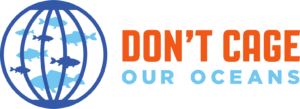It seems like the revolving door just doesn’t stop spinning. Only last week we noted how the lobbyist for big aquaculture trade organization Stronger America through Seafood left to join its key member corporation Cargill as its DC lobbyist. And now we learn that a scientist who up until recently advised NOAA’s aquaculture department is now directly working with the Hubbs-SeaWorld Research Institute (HSWRI). The President and CEO of HSWRI, Don Kent, welcomed the former NOAA scientist as “a good friend.”
HSWRI has made headlines for teaming up with the Pacific6 Enterprises investment group to push for a for-profit factory-style fish farm in federal waters, about a mile away from the La Jolla marine protected area. The Pacific Ocean AquaFarms project, as it is called, aims to produce 5,000 metric tons (or 11 million pounds) of yellowtail fish annually in federal waters, four miles from the California coast. NOAA has stated that the project would take up 323 acres of space, and include 28 submersible pens.
Environmental and fishing organizations are on record as being in fierce opposition to this project. San Diego Coastkeeper’s Matt O’Malley has cited the problems with “pollution in the water from excess food and fish feces,” and how “it’s been documented that there is sea lice, pathogens, and disease” that would impact wild species. Pete Halmay, who represents the San Diego Fishermen’s Working Group, has noted “a number of environmental and socioeconomic risks” and pointed to the HSWRI’s foot-in-the-door strategy, by stating “if this is allowed to go there, I envision 10 more cropping up. You’re privatizing the ocean.”
Our federal agencies are supposed to be made up of public servants who are interested in looking out for what is best for the public and our natural resources. In many cases, this holds true. But the aquaculture department in NOAA has exhibited an unbridled enthusiasm to go to bat for big industry time and time again, and regularly dismisses the stakeholder input provided by everyday people, concerned coastal residents, and small businesses who stand to lose from these behemoth fish farms. This week’s news is just yet another unfortunate demonstration of that conflict of interest.

